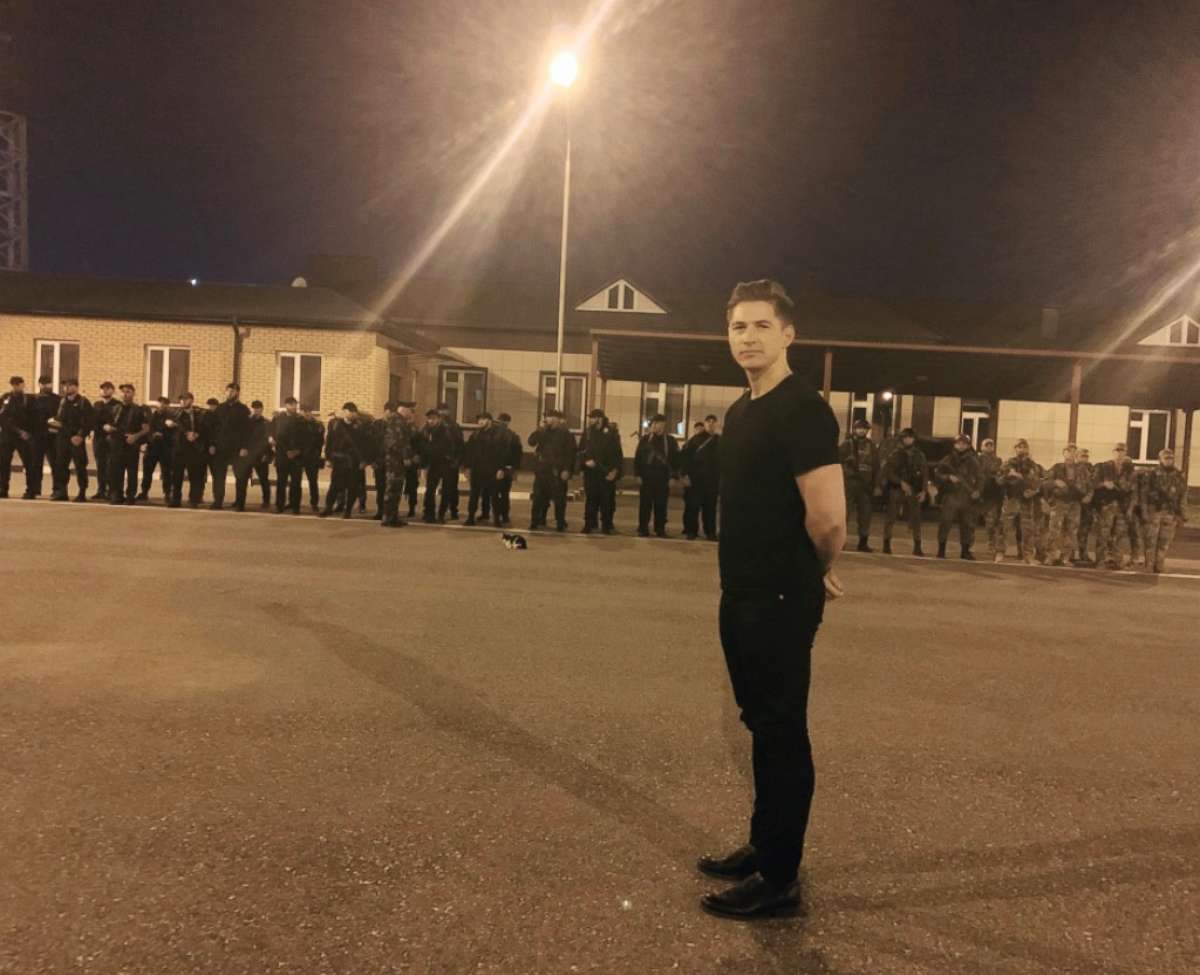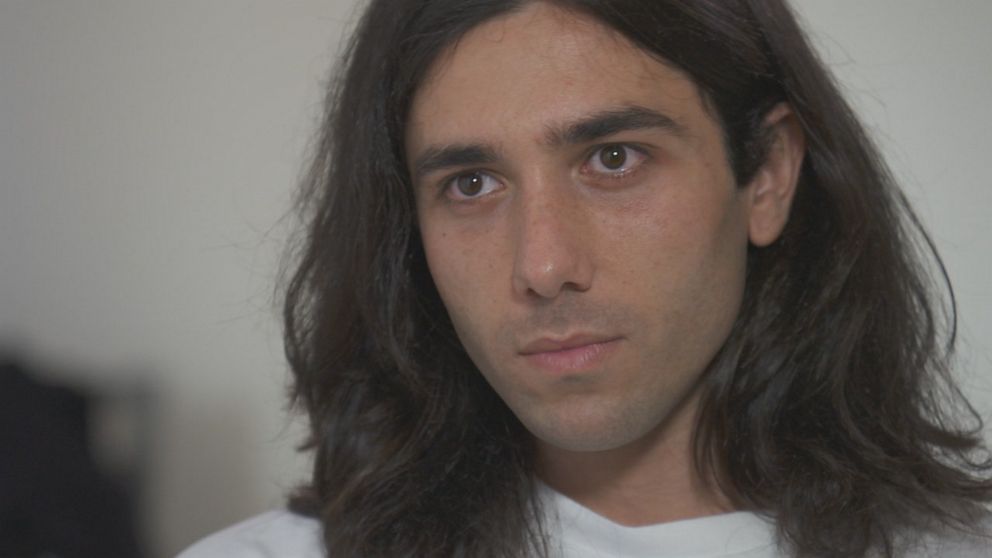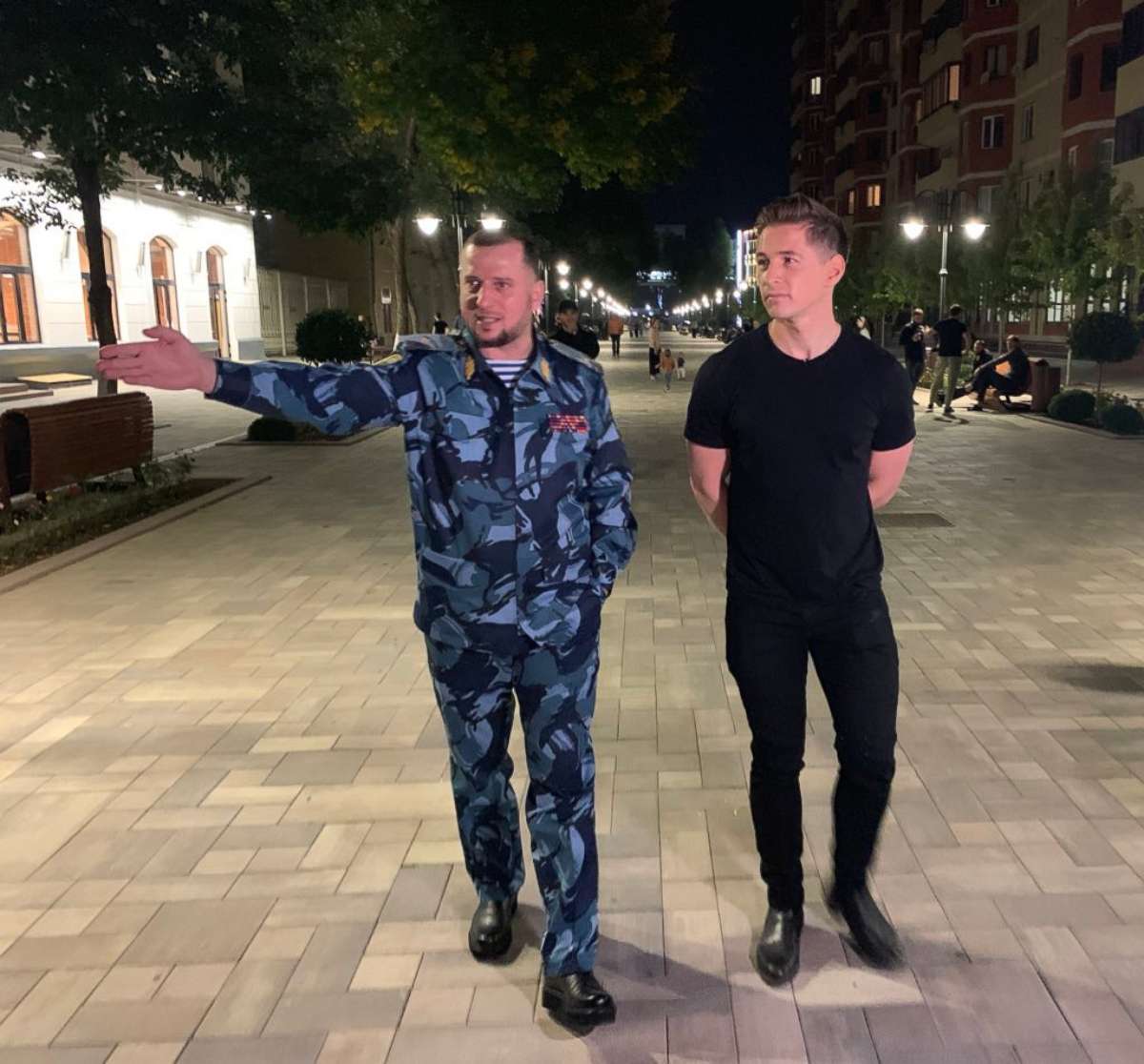'Any day you can be taken': Inside what it's like to be gay in Chechnya
Dozens of LGBT people have allegedly been rounded up and tortured.
GROZNY, Russia -- Ricky said he had known the man who betrayed him for 10 years.
He was 19 and for most of his life he had lived a relatively sheltered life near Grozny, the capital of Chechnya, the autonomous republic in southern Russia. Ricky-- a pseudonym-- had known he was gay since his early teens but had almost never dated. His relationships were mostly restricted to a tiny circle of friends who had discovered their sexuality together as they grew up. He was careful, he would normally only meet people 3 or 4 times a-year.
Then one day the police arrived at his work.
"The first day they took me and locked me in the cell in our city police station," Ricky said. "Then they took me to another place." After that, the torture began.
"At first, they were just beating me. They punched me and then they hit me with electric shock. They did waterboarding, which was the worst," Ricky told ABC News in a recent interview.
The police had discovered Ricky because of one his friends. They confronted him with a video passed to them by the friend that showed them together, discussing LGBT issues.
"I gave up then. I really thought they were going to kill me," Ricky said. "They said it would be better if I was a terrorist than gay."
Ricky's ordeal was in mid-2018 and it was a familiar story.
In early 2017, the world had became aware of reports that Chechen authorities were rounding up and torturing dozens of men they suspected of being gay, in what came to be known as a "gay purge". Over 100 men were reported by rights groups to have been swept up by the security services and taken to police stations and secret prisons. From there, many accounts emerged describing beatings with plastic rods, electrocution, waterboarding. Rights groups have since reported several suspected deaths.
The international outcry to the alleged abuse of the LGBT community in Chechnya was huge -- protests were held in cities around the world and Western governments condemned the reports. The Trump administration imposed sanctions on top Chechen officials for their role in the persecution.
Three years later, however, little has changed and no one has been held accountable. Instead, reporting by ABC News and others shows that-- while not on the same scale-- the detention and torture of LGBT people in Chechnya never really stopped. Nor did it begin in 2017.
In January 2018 Russian LGBT activists reported a fresh wave of detentions, this time also involving gay women. Although far smaller than in 2017, it underlined a grim reality, that the so-called "purges" are in fact more like spikes in what is a routine practice in Chechnya-- the detention and torture of men suspected by police of being gay.

For almost a year, ABC News has recorded the stories of LGBT men and women persecuted in Chechnya and the surrounding region, or living in terror of exposure there. The names of most of those interviewed have been changed at their request out of concern the Chechen authorities or their families might harm them.
Their accounts paint a picture of a place where there is now virtually no space to be gay, where dating carries potentially lethal consequences and the suppression of their identity is obligatory for LGBT people.
"Any day in Chechnya you can be taken," Ricky said. "There is no life."
'It's a dictatorship'
Chechnya is a republic traumatized by violence. Located on Russia’s southwestern edge in the mountains of the North Caucasus, the area was devastated in two wars between the mid-1990s and later 2000s with Russia. Russian federal troops, crushing a separatist rebellion and then an Islamic insurgency, devastated the republic. Grozny was levelled and hundreds of thousands were killed.
Since 2007, Chechnya has lived under the rule of Ramzan Kadyrov, a former rebel appointed by Russian President Vladimir Putin to subdue Chechnya. He has done that, using allegedly savage methods, and in the process Kadyrov has remodelled Chechnya around himself, erecting a police state and a cult of personality built around an obsessive machismo centered on sport, particularly martial arts.
In the majority-Muslim region, with a deeply conservative culture, being gay was never accepted. But under Kadyrov, the suffocating strictures defining Chechen identity have narrowed even further and are sometimes brutally enforced.
"It is a dictatorship," said Harlem, who fled Chechnya several years ago and now runs LGBT World Beside, an NGO that tries to help gay people leave the Caucasus. "Everything is decided for you. Everyone should live the same way -- have a family and be a good example."
In 2017, that conservative hostility to homosexuality seemed to convert into organised terror, part of a broader conservative campaign that has also targeted drug and alcohol users.
Amin Dzhabrailov, 27, only the second man to come forward publicly about his detention in 2017, told ABC News that armed police took him from the hair salon where he was working. For 14 days, he said, he was held in a basement with several other gay men, taken out for torture sessions, where he was electrocuted and subjected to a mock execution.

"They put me on the wall, put bag on my head," he remembered. "That guy charged his gun and put [it] right here, on my head. And I started painting the wall with my blood. And he said that it's my last seconds."
Almost all the people who have spoken to ABC News said the men who took them were members of Chechnya’s police. They described active attempts to hunt down gay men using informants and surveillance. They said the people who tortured them would demand they names other gay men.
'For us, it’s crazy that someone among us might be gay'
Chechen authorities have dismissed the allegations as invented. Kadyrov and other officials have famously said gay men don’t exist in Chechnya.
In reality, Kadyrov’s inner circle have been accused of playing key roles in the 2017 "purge." Magomed Daudov, Chechnya’s speaker of parliament, known by his nom de guerre, "Lord," was alleged by Human Rights Watch to have "persuaded the Chechen leadership" to set it in motion. Some victims have told HRW and ABC News that Daudov was personally present in while they were tortured.
When ABC reporters encountered Daudov by chance in their hotel in Grozny, he dismissed the allegations and told said he was "proud" of U.S. sanctions against him (he was sanctioned in 2013 for his alleged role in the kidnapping and torture of a Chechen politician.)
But he and others officials made no attempt to conceal their hostility to LGBT people.
"For us it’s crazy that someone among us might be gay," Apti Aluadinov, Chechnya’s deputy interior minister and a top commander of its police forces, told ABC News in September. "Ask any Chechen if there is a gay in his family, he will punch you in the face," Aluadinov said.
Aluadinov, who was also sanctioned in 2013 by the United States over the same case as Daudov, claimed the gay men alleging torture were simply seeking asylum in the West or that they themselves were likely not Chechens. Over several hours he took ABC reporters to a regional police base just outside Grozny, driving them there himself. When the reporters arrived at the base, a 58-man strong garrison was drawn up on the parade ground in full-battle gear. Inside, Aluadinov showed the reporters the empty cells, which were clean and looked rarely used, as though mostly display.
He insisted he couldn't conceive how a Chechen man could be gay and said it was not him but Chechen society that will not tolerate gay men.
"He is not afraid of me. He is afraid of his own family," Aluadinov said.
'I asked them to throw me out the window'
For LGBT people in Chechnya, a double life is obligatory. The fear is not only of the state but also of their own families and local communities, where homosexuality is perceived as bringing shame. Victims have repeatedly described being handed back over to their families with a suggestion that they kill them themselves and many of speaking anonymously said they feared their relatives would harm them if they found out.
In such circumstances, discussing homosexuality, let alone coming out is impossible. Many LGBT men and woman marry members of the opposite sex, under pressure from their families.
"If men stand out, even with their clothes, it is already a problem," said Omar, 24.
Omar was still living in Chechnya when ABC News interviewed him (meeting outside the republic to protect his safety). He described a daily sapping fear, where every interaction with the police could carried potentially catastrophic circumstances.
Then during the new wave of arrests last winter, Omar's mother inadvertently discovered he was gay. She threatened to hand him over to relatives in the security services, he said. For months, Omar he lived in fear he might be about to killed. He eventually sought asylum in Europe.
Ruslan, a bisexual man living in the neighboring republic of Dagestan, where attitudes are very similar to Chechnya, had a wife and a 1-year-old baby when he said his life was destroyed.
Five men lured him to an apartment where they beat him and forced him to admit he was gay on camera. The men demanded a few thousand dollars. When Ruslan couldn’t pay, they posted it on YouTube the next day.
"I asked them to throw me out the window. I asked them just to kill me. But no, they wanted money," Ruslan said.
'It’s harder for women because they can’t leave'
Many LGBT Chechens link the eruption of more systematic violence in the past few years to a worsening atmosphere of homophobia in Russia, signaled by the passing of the notorious so-called "anti-gay propaganda" law in 2013.
That law, which effectively banned public displays of homosexuality, has been criticized by rights groups as green-lighting discrimination and violence against LGBT people.
All over Russia, gay people reported increased hostility. But in Chechnya it seemed to encourage and may have later given cover to extreme violence by the security services.
Before 2016, there was still a tiny but still active underground gay scene in Chechnya.
Tabitha, a young woman who fled that year, told ABC News she would rent apartments in Chechnya to party in. She would gather groups to drive to clubs in nearby regions.
"From around 2009 till around 2014, there were clubs where lesbians could get together, dance, talk," said Tabitha. "But they have closed now. In fact, all clubs have closed there, really."
"People are afraid now," she said. "The police have ears everywhere -- in hotels, there are cameras, microphones," she said. Most lesbian's romantic lives are reduced to talking on online messenger services, she said, or meeting in cafe.
In some ways life in Chechnya, where women are already face restrictions, is even harder for gay women.
"Men have more freedom, but they have more threats. It’s harder for women spiritually," said Tabitha. "It’s harder for women because they can’t leave, they can’t go anywhere."
'I’m proud'
Despite the international outcry, Russia has mostly turned away criticism of the Chechen government. No high-level Russian official has ever condemned the reported detentions and Russian authorities have argued they cannot investigate because the victims are anonymous.
But in late 2017, Maksim Lapunov came forward publicly describing how he was kidnapped off the street in Grozny and tortured. He filed the first and so far only criminal complaint over his torture.
Lapunov's public allegations, amid intense international pressure, compelled Russia's Investigative Committee to open a probe into his case. But after less than a year, a court in Lapunov’s hometown of Stavropol ordered it closed, citing lack of evidence. Lapunov, receiving death threats, fled for his life, and now lives in Europe where he has asylum.
The Russian investigation, as Lapunov's lawyer and rights groups pointed out, ignored key information. In particular, Lapunov has said he had his phone on him, allowing him to prove that during his disappearance he had been in a building in the heart of Chechnya's security district.
Chechen officials, like Aluadinnov, though have seized on the investigation to assert Lapunov's accusations are baseless. And despite the growing body of evidence

Still insecure here
Since the first "purge," some Chechens have fled the region, helped most often by LGBT organizations.
The Russian LGBT Network, a St. Petersburg-based nongovernmental organization that provides safe houses in Russian cities, said it has helped over 150 people leave since 2017.
But fleeing Chechnya does not mean an automatic end to hardship. LGBT Network cannot provide people with shelter indefinitely and some who fear being kidnapped have said they have been unable to receive asylum.
Some who had left told ABC News they felt they face a grim Catch-22 -- they need asylum to avoid torture, but cannot prove it until they already have been.
Rights groups say there are mechanisms in place to prevent this situation for asylum seekers. But some men ABC News has met with have found themselves semi-homeless after fleeing to Moscow.
In Europe, the situation is also often not easy. In asylum centers, many of the residents are from conservative countries who are also intolerant of homosexuality.
Most frightening for some is the large Chechen diaspora in Europe. Chechen refugees have described receiving threatening messages on the chat service Whatsapp from a group of men saying they have taken it on themselves to police behavior among Chechens abroad, including threats against asylum seekers for dressing inappropriately. Police also warn the Chechen authorities can use the diaspora to strike at those speaking against it.
"We still feel insecure even here," said Harlem.




